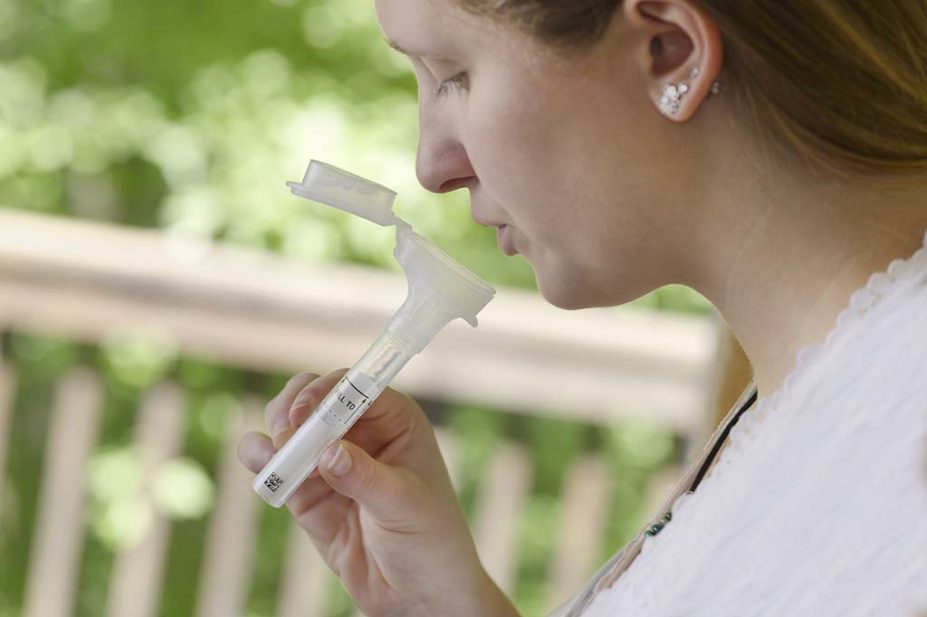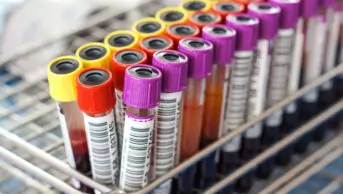
Mclean/Shutterstock.com
The case for a more personalised approach to medicine through pharmacogenomic testing has been made time and time again.
A report published earlier in March 2022 by the Royal College of Physicians (RCP) and British Pharmacological Society noted that a genetic cause has now been established for variation in the response to more than 40 medicines. Experts estimate that routinely testing patients for common drug–gene interactions, which already happens in countries across the world, such as the United States, Canada, Australia and the Netherlands, could reduce drug adverse reactions by a third and better guide appropriate drug use.
However, in the UK to date, pharmacogenomic testing in the health service has been restricted to detecting rare genetic diseases, such as Huntingdon’s disease, or before initiating a specific type of chemotherapy treatment for cancer.
A broader approach has been under consideration for a long time, with the most likely outcome being a one-off test of a panel of drug–gene pairs, the results of which can be considered each time a new drug is prescribed. But, as the RCP report concluded, rolling this proactive approach out to the NHS “is not straightforward”. Not least because this would be the first time pharmacogenomic testing has been integrated into a whole healthcare system, rather than a hospital, research centre or network of clinics.
Some of the medicines being touted as top of the list for pharmacogenomic testing are commonly used — including citalopram, clopidogrel and codeine — and experts say there is a risk of opening the floodgates to tests without an understanding of what to do with the results.
But this all may about to change. The NHS England five-year plan on genomic medicine, published on 12 October 2022, says that over the next three years it will review the evidence for “real-time” decisions informed by pharmacogenomics to form “part of routine clinical care”. The Pharmaceutical Journal has also obtained information that reveals pilots testing patients routinely when prescribing in GP practices are about to begin.
Progress so far
In 2020, DPYD variant testing for people with colorectal and breast cancer under consideration for treatment with 5-fluorouracil chemotherapy was introduced across the UK. It was the largest testing programme of its kind in the NHS and thousands have now been tested, giving the health service confidence that these schemes can have a real impact on patient care.
The ambition is to move to gene panels, of which there are several commercially available, to test for a range of drug–gene pairs that can affect the metabolism, and therefore the effectiveness or tolerance of commonly used medicines, in one go. Test arrays include the AgenaTM iPLEX PGx 74 and CYP2D6 copy number panels, which cover the most relevant variants of 20 key genes involved in drug metabolism.
One gene on the panel is CYP2C19, which codes for a liver enzyme that acts on around 10% of drugs in common use, including benzodiazepines and clopidogrel. Another gene, CYP2D6, is responsible for the metabolism and elimination of around a quarter of medicines. Variants can render people slow or fast metabolisers who would benefit from an adjusted dose and metoprolol and nortriptyline are among the drugs affected.
Before the COVID-19 pandemic struck, an NHS England and Genomics England joint pharmacogenomics working group had started to consider which drug–gene pairs should be evaluated further. A list of potential drug–gene pairs from the working group — dated March 2020 and obtained by The Pharmaceutical Journal through a Freedom of Information request — details 31 medicines related to 13 genes (see Table). However, NHS England has said that the work of that group ground to a halt after the COVID-19 pandemic hit.
A new Genomics Test Evaluation Working Group for Pharmacogenomics has now begun to work on the issue once more and had its first meeting in June 2022. The group of clinical and pharmacogenomics experts plans to evaluate what tests should be added to the NHS Genetic Testing Directory, which details the tests that are available free on the NHS in England, and it will next report in April 2023.
Dyfrig Hughes, co-chair of the working group and professor of pharmaco-economics at the University of Bangor, Wales, says two tests were added to the directory in 2021, including thiopurine methyltransferase (TPMT), which detects patients who are at risk of developing severe side effects if treated with the thiopurine drugs, azathioprine, mercaptopurine and thioguanine. However, now a whole new list is under consideration.
“The end of August [2022] was the cut off and I have not seen the list yet, but I hope there will be a lengthy list of pharmacogenetic tests, which people have been asking for to be made available nationally,” he adds.
“We will then appraise these in the committee and discuss the evidence and make a recommendation.”
Progress pilot
Minutes from the June 2022 meeting, obtained by The Pharmaceutical Journal via a Freedom of Information request, reveal that a pharmacogenomic testing pilot (known as ‘Progress’) will start in early 2023 in five GP practices in the North West of England, looking at patients being prescribed statins, certain antidepressants and proton pump inhibitors.
William Newman, professor of translational genomic medicine and head of the team at the University of Manchester, who is running the pilot, says this is not about looking at the benefits of testing but at the practicalities of how it can be embedded in the NHS.
“The project is based in the North West Genomic Medicine Service Alliance [GMSA] but there are plans for it to be a national programme for [2023].”
It comes in three parts, he explains: evaluating which commercially available test array should be used in the pilot, a decision on which will be made before the end of 2022; developing the IT solution that records test results in a useful way on GP systems; and actually doing the testing.
Making sure that something is truly interoperable and allows you to link different types of assay into different healthcare records is doable but challenging
William Newman, professor of translational genomic medicine and head of the team at the University of Manchester, who is running the pilot
Patients will be eligible if they start or change a prescription for a relevant drug and will be offered a panel test, the results of which will come back to the practice with guidance about what that result means for their prescribing options or dose. They have started where there is the most evidence. “This is an implementation study to see if we can get a sample from a patient to the lab back again, and that information is actioned and that is acceptable to the patient to the GP, that the whole process works,” he says.
The IT is actually one of the hardest bits to get right. “Making sure that something is truly interoperable and allows you to link different types of assay into different healthcare records is doable but challenging.”
Newman notes that it was important to the team that each GP practice chosen for the pilot employs a GP pharmacist who would be involved in the pilot. A scoping exercise on what this all means for community pharmacy is being done by colleagues at the University of Birmingham.
Staged roll-out
A year down the line, Newman says he believes testing will still be relatively small scale but with other pilots or early adopter practices in the other six GMSA regions in England.
“We’ll have got some really good information about the feasibility of implementing [pharmacogenomic testing] and the attitudes from GPs as to the usability of the data, how useful it is and what the challenges were. This can only happen with a staged roll-out.”
Hughes, who is also co-director of the Centre for Health Economics and Medicines Evaluation at Bangor University, says implementation pilots are also being planned in primary care in Wales around clopidogrel prescribing and will be led by GP practice pharmacists.
“Our pilots, which are in the early days of planning and preparation, are looking at CYP2C19 but in a primary care setting,” he adds. Patients they will be targeting may have been on clopidogrel for a number of months or even years and not have experienced any benefit from it. They are also planning to use a panel test but, for the purposes of the pilot, not report on the other genes.
“When it then reaches wider roll-out, you can reveal more than one finding from it and, ultimately, a whole range of genes but it has to be carefully introduced you can’t just reveal it all because the clinical evidence for some of them is not very strong,” he explains.
“We will be using a commercial test, but there is scope to tweak it, for example to include DYPD, which is something we will be looking to do.”
‘PREPARE’ study
Munir Pirmohamed, chair of pharmacogenetics at NHS England, agrees the speed of implementing pharmacogenomic testing in the UK has been frustrating because the evidence has been there for a long time.
“But, hopefully, there’s an awful lot of movement in the right direction so that the NHS will have to think about implementing this for the benefit of its patients.”
While he is cautious about pinning down timescales, noting the pressures that the NHS is under at the moment, Pirmohamed points to several projects such as ‘Progress’, which demonstrate that the NHS is serious.
At the time of publication, results from the ‘PREPARE’ (‘Preemptive Pharmacogenomic Testing for Preventing Adverse Drug Reactions’) study were also imminent. This study, the largest to date looking at the avoidance of harm with pharmacogenomic testing, involved almost 7,000 patients across seven European centres, including Pirmohamed’s team in Liverpool, and has been running since 2017.
In ‘PREPARE’, patients receiving a first prescription for one of more than 39 drugs — including codeine, clopidogrel, escitalopram, flucloxacillin and simvastatin — were tested with a gene panel with results used to drive dose or drug decisions. At the outset, the team predicted this approach may decrease clinically relevant adverse drug reactions by 30%, although the actual results are still in the process of being published.
This is the way forward, Pirmohamed says: “So, if somebody comes in with a particular condition with this particular drug, you get the test done at that time. But, at the same time, you do a lot of other tests because it doesn’t cost much more, and then you store the rest of the data on the electronic health record.”
‘Bigger than COVID-19 testing’
Hughes notes that the tests are relatively cheap — they only need to be done once — and they are easy to carry out, but the important reason why caution is needed is that widespread testing could very easily overload the system.
“We all effectively carry variants that are potentially actionable pharmacogenes, so you might end up testing the whole population, literally 65 million people.”
He adds that a middle-aged person would have around 60% chance of encountering a drug that could be informed by pharmacogenomics over a 10–20 year period.
When you then roll out to codeine, for instance, you’re into millions of people, so there has to be some very careful management of that
Dyfrig Hughes, co-chair of the working group and professor of pharmaco-economics at the University of Bangor
“When you put those two pieces of information together, it’s vast swathes of society that would need to be tested. So, it has to be managed because that would be on a scale bigger than COVID-19 testing.”
“This is why we’ve purposely focused in on those with the greatest evidence, with the greatest likelihood of benefit, and where a particular patient group can be identified,” he says.
“When you then roll out to codeine, for instance, you’re into millions of people, so there has to be some very careful management of that.”
In Scotland, a large study of 10,000 patients is also about to get underway. Some details are under wraps as contracts are in the process of being signed but it will be a collaboration between industry, academia and the NHS. Led by the Living Lab at the University of Glasgow, and known as the Prophecy study, the aim will be to look at how a pharmacogenomics panel test can help inform patients where polypharmacy is an issue.
Jill Swan, a Scottish Pharmacy Clinical Leadership Fellow in Pharmacogenomics, explains: “This is retrospective rather than using that genomic panel to then dictate future prescribing decisions, but it’s looking at is this a model that works, is it usable? Greater Glasgow and Clyde is our biggest health board so there will be a significant number of patients involved and if they can utilise it in Glasgow is that something that could be rolled out across Scotland and beyond as a clinical support tool?”
Pharmacy is vital
In May 2022, the launch of a single genomic test was launched to guide prescribing of clopidogrel in acute stroke services in NHS Tayside — the first such service in the UK.
“The biggest challenge, and you will have heard this from England as well, is around the digital aspect and where that sits because it’s brilliant having pharmacists and pharmacy teams in community having that knowledge but if they can’t access the test results it doesn’t make any sense,” Swan says.
But she is optimistic that things are now starting to move towards adoption of these technologies in the NHS and while there was always progress being made, it wasn’t always that visible. “There is a lot of momentum. There were three fairly major pharmacy conferences this weekend and all of them had genomics on the bill. But it is huge and it doesn’t fit within any one sector so that makes it harder. It’s not something we can adopt really quickly and it’s a case of where do you start.
“There’s a lot that’s theoretical and now we need to move into real world data. Studies like [Prophecy] are powerful because it’s going to be so broad and it’s going to be really interesting.”
Box: What pilots are planned?
England
The Our Future Health programme will invite 3 million adults in West Yorkshire, the West Midlands, Greater Manchester and Greater London to take part in a study to develop and test genetic risk scores for common diseases. It is backed by £80m in government funding and around £150m from industry.
The Progress pilot study will begin early 2023 in five general practices in the North West of England looking at the feasibility of a pharmacogenetic panel for patients starting or changing a prescription of statins, certain antidepressants and proton pump inhibitors. If all goes well, the pilot will be expanded to the other six Genomic Medicine Service Alliance regions.
A site in Liverpool was also involved in the PREPARE study of the impact of a panel test on adverse drug reactions in 7,000 patients across Europe. Results are imminent.
The Genomics Test Evaluation Working Group for Pharmacogenomics will also continue to evaluate which tests should be added to the national genetic testing directory on a case-by-case basis.
Scotland
In May 2022, a single gene test for clopidogrel was launched in the acute stroke service at NHS Tayside.
Plans are also underway for the Prophecy study — a collaboration between academia, the NHS and industry to look at using a panel test in 10,000 patients identified as being at risk of adverse outcomes owing to polypharmacy.
Also, the Scottish Strategic Genomics Network is planning to develop a national approach to rolling out pharmacogenomic testing across Scotland.
Wales
In Wales, pilots are being planned to look at the use of a panel test in primary care. Initially the focus will be on clopidogrel and CYP2C19 but there is potential to include other drugs further down the line. Discussions are underway about which commercially available panel to use and whether it could be tweaked to meet the requirements of the NHS.
Genomics Partnership Wales was set up in 2018 to support the delivery of precision medicine in the NHS.


